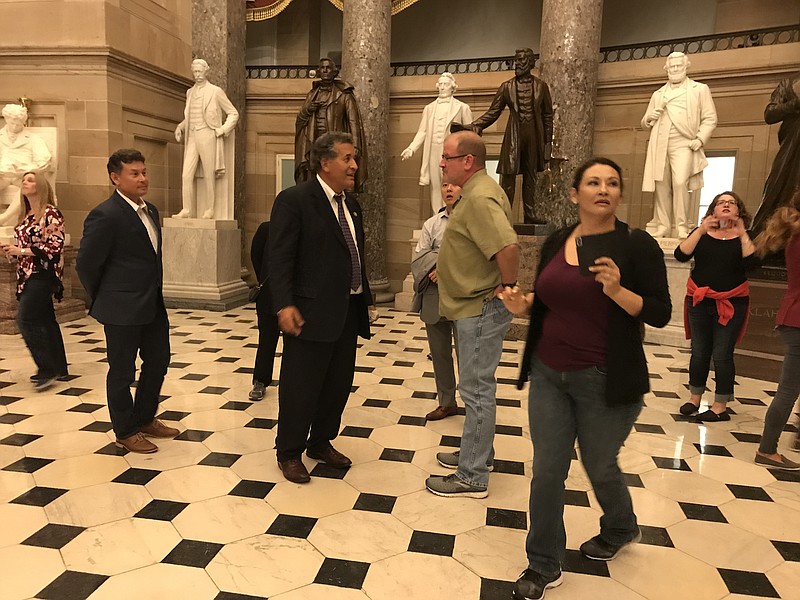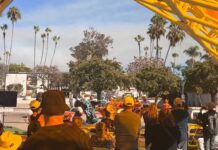A delegation of more than 100 San Diego and Baja California business and civic leaders in Washington, D.C. concluded Wednesday with optimism for cross-border business.
“I think this has probably been our best trip,” said Jerry Sanders, president of the San Diego Regional Chamber of Commerce, which has led annual delegations to D.C. and Mexico City for a dozen years.
Sanders said the enthusiasm came from being in D.C. on the eve of a deal to modernize the North American Free Trade Agreement (NAFTA), as the United States-Mexico-Canada Agreement (USMCA), which is expected to help manufacturing, technology and service industries in the San Diego-Tijuana region.
While President Trump portrayed the new deal as a dramatic transformation of NAFTA, adding that USMCA has «a nice ring to it,» members of the delegation told KPBS they saw USMCA as «NAFTA 2» or «NAFTA 2.0.»
Mexico’s Consul General for Tijuana, Marcela Celorio, said some Spanish speakers have decided to call the deal «Camexus.»
The delegation was lobbying for the updated NAFTA, which still needs approval from the three countries’ legislative bodies. They were also requesting funding for ports of entry improvements, homeless services, cross-border water contamination problems and more. They had meetings with the U.S. Department of State, Customs and Border Protection, the Environmental Protection Agency and more.
Sanders said Customs and Border Protection told the delegation that the agency would be launching pilot projects in the San Diego area to test new technologies that would help speed up the legal cross-border flow of people and goods.
“They want a seamless border, and I think technology is probably one of the better ways to do it — there’s technology with sensors and everything else right now that is far better than physical barriers — so they’re really interested in trying some of those things in San Diego,” he said.
San Diego and Baja California leaders meet with Mexico’s …
PHOTO BY JEAN GUERRERO
San Diego and Baja California leaders meet with Mexico’s Ambassador to the U.S., Oct. 2, 2018.
Mexico’s Ambassador to the U.S., Gerónimo Gutiérrez, told the delegation that he would continue pushing for funds to create a new toll-operated port of entry in Otay Mesa, an infrastructure project that is expected to decrease wait times at existing ports of entry.
“In my view, that project should be moving faster,» Gutierrez said. «We have not done enough.»
Gutiérrez added that the need for efficient ports of entry will be greater under USMCA, which he believes will boost trade between the U.S. and Mexico. He praised the delegation for its efforts to bring the two countries together, including by pushing for expansions to the Calexico-Mexicali port of entry.
“The Cali-Baja region is a great example on how things can be approached, how our shared challenges at the border — whether it’s environment, security infrastructure, you name it — can be addressed in a way that benefits both countries,” he said.
One of the members of the delegation was Oscar Escobedo, Baja California’s tourism minister, who asked the Ambassador for help proposing a binational trolley project, which he said would decrease congestion at the ports caused by people traveling back and forth.
The delegation also had a late-night tour of the Capitol with Congressman Juan Vargas, who told KPBS that he was «skeptical» of the new trade deal because he doesn’t believe it helps Mexico’s rural poor.
But Vargas said he would help the delegation members get the money they wanted for ports of entry.
«During all this discussion we’ve been having about closing borders, we’ve actually been able to open them up and make them more efficient,» he said. «Without the chamber having invested their time, their energy and their money in this process, I don’t think we ever would’ve gotten San Ysidro (port expansions) accomplished.»





